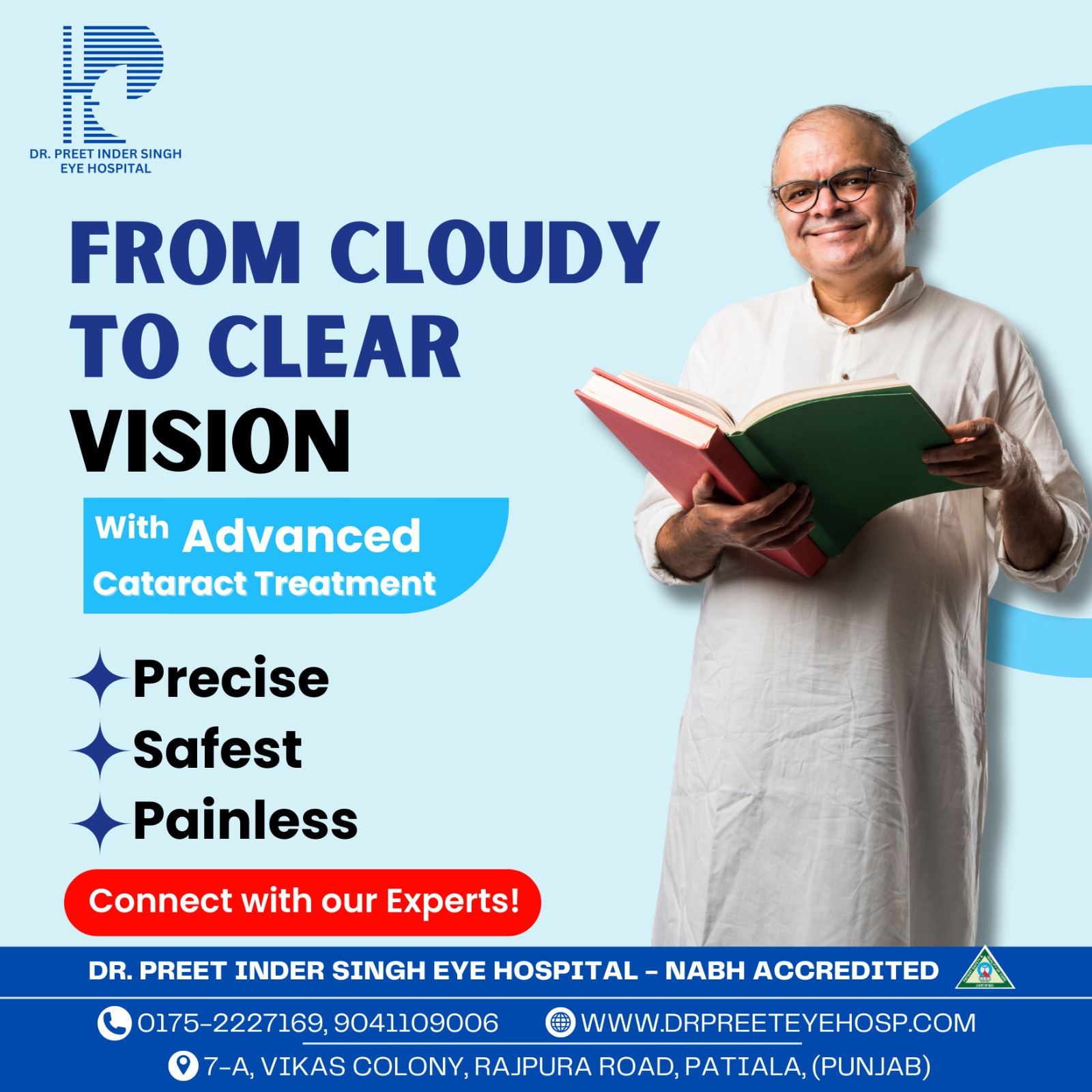Cataract Surgery in Patiala
Cataracts are one of the most common eye conditions that can affect vision, especially as people age. Fortunately, with advancements in medical technology, cataract surgery has become a safe, effective, and quick procedure to restore clear vision. If you’re seeking Cataract Surgery in Patiala, Dr. Preet Inder Singh Eye Hospital is a trusted name with a reputation for providing exceptional eye care services.
Founded in 1994 by Dr. Preetinder Singh, this hospital has been a leader in eye care in Patiala for over two decades. With years of experience and a team of skilled ophthalmologists, Dr. Preet Inder Singh Eye Hospital ensures patients receive the highest quality treatment for various eye conditions, especially cataracts. Whether you’re dealing with early signs of cataracts or need advanced surgical intervention, the hospital offers a wide range of eye surgery options tailored to meet individual needs.
Why Choose Us for Cataract Surgery in Patiala?
When it comes to your vision, choosing the right eye care facility is crucial. At Dr. Preet Inder Singh Eye Hospital, patients can expect top-notch care in a comfortable, patient-friendly environment. Here are a few reasons why this hospital stands out:
Highly Experienced Team
Led by Dr. Preetinder Singh, one of Patiala’s top eye surgeons, the hospital boasts a team of skilled specialists. They have successfully performed thousands of cataract surgeries, ensuring patients receive expert care.
Advanced Technology
The hospital utilizes cutting-edge equipment for cataract surgeries, including laser techniques and phacoemulsification. These advanced methods ensure faster recovery times and precise results for every patient.
Patient-Centric Approach
Dr. Preet Inder Singh Eye Hospital focuses on personalized care, understanding each patient’s unique condition. This commitment makes it one of the most trusted eye hospitals in Patiala.
Affordable Cataract Surgery Options
The hospital offers affordable cataract surgery without sacrificing quality. From basic to advanced procedures, they provide cost-effective solutions tailored to different budgets.
Comprehensive Cataract Treatment Services
Cataracts can cloud the natural lens of the eye, leading to blurry vision, difficulty seeing at night, and sensitivity to light. The most effective way to treat cataracts is through surgery, where the clouded lens is replaced with a clear, artificial one. At Dr. Preet Inder Singh Eye Hospital, patients have access to the latest surgical techniques to ensure safe and successful outcomes.
How Does Cataract Surgery Work?
The surgery typically involves making a tiny incision in the eye and using advanced techniques like phacoemulsification, which uses ultrasound waves to break up the cataract before it’s gently removed. The doctor then inserts an artificial lens, known as an intraocular lens (IOL), to restore clear vision. This surgery is generally completed in less than 30 minutes, and most patients experience significant improvement in their vision within a few days.
Whether you’re looking for a basic cataract treatment in Patiala or more specialized options like laser eye surgery, Dr. Preet Inder Singh Eye Hospital has you covered. With a focus on patient safety and satisfaction, you can rest assured that you’re in capable hands.

What to Expect During Cataract Surgery Recovery
Cataract surgery is a routine outpatient procedure, meaning you can go home the same day. While recovery is typically quick, it’s important to follow your doctor’s instructions carefully. Here’s what you can expect:
- Immediate Results: Most patients notice an improvement in their vision within 24 to 48 hours post-surgery.
- Minimal Discomfort: Mild discomfort, such as itching or sensitivity to light, is normal for a few days after surgery.
- Quick Healing: Full recovery usually takes about a month, with most patients returning to normal activities within a few days.
Frequently Asked Questions About Cataract Surgery
If you’re experiencing blurry vision, difficulty reading, or trouble seeing at night, you may need cataract surgery. Dr. Preet Inder Singh Eye Hospital offers comprehensive eye exams to determine whether cataracts are affecting your vision and whether surgery is the best option.
No, cataract surgery is generally painless. You’ll receive a local anesthetic to numb the area around your eye, ensuring you remain comfortable throughout the procedure.
The procedure usually takes about 15 to 30 minutes, and you’ll be able to go home the same day. However, you should arrange for someone to drive you home as your vision may still be blurry for a few hours post-surgery.
Like any surgery, cataract surgery carries some risks, though they are minimal. Potential complications may include infection, bleeding, or swelling. At Dr. Preet Inder Singh Eye Hospital, the risk of complications is reduced by using advanced surgical techniques and equipment.
The cost of cataract surgery can vary depending on the type of lens implant used and the complexity of the procedure. Dr. Preet Inder Singh Eye Hospital offers affordable cataract surgery in Patiala, with options tailored to fit different financial needs. Contact the hospital for a detailed quote based on your specific case.
Schedule Your Consultation Today
If you’re experiencing symptoms of cataracts, don’t wait until it severely impacts your vision. Dr. Preet Inder Singh Eye Hospital is the leading choice for cataract surgery in Patiala, offering state-of-the-art care at affordable prices. The hospital is known for its expertise in eye surgery in Patiala, particularly in providing high-quality cataract treatment with personalized care.
Whether you’re in need of a routine eye exam or a cataract surgery doctor in Patiala, this hospital provides comprehensive eye care services for patients of all ages. With their commitment to excellence and patient-focused approach, you can trust them for all your vision needs.

